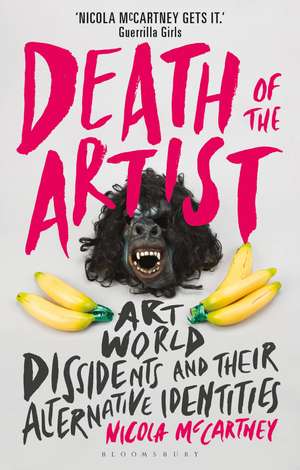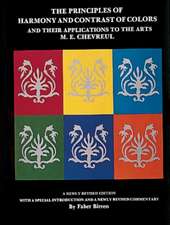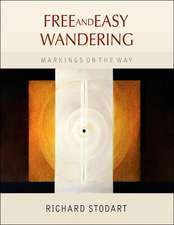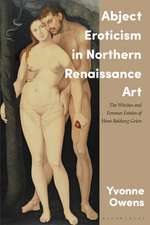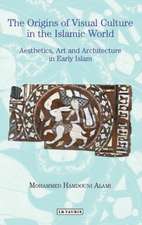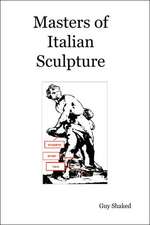Death of the Artist: Art World Dissidents and Their Alternative Identities
Autor Nicola McCartneyen Limba Engleză Paperback – 6 ian 2020
| Toate formatele și edițiile | Preț | Express |
|---|---|---|
| Paperback (1) | 96.37 lei 3-5 săpt. | |
| Bloomsbury Publishing – 6 ian 2020 | 96.37 lei 3-5 săpt. | |
| Hardback (1) | 467.65 lei 6-8 săpt. | |
| Bloomsbury Publishing – 29 iul 2018 | 467.65 lei 6-8 săpt. |
Preț: 96.37 lei
Preț vechi: 156.06 lei
-38% Nou
Puncte Express: 145
Preț estimativ în valută:
18.44€ • 19.72$ • 15.38£
18.44€ • 19.72$ • 15.38£
Carte disponibilă
Livrare economică 28 martie-11 aprilie
Preluare comenzi: 021 569.72.76
Specificații
ISBN-13: 9781501360558
ISBN-10: 1501360558
Pagini: 312
Ilustrații: 19 bw illus
Dimensiuni: 138 x 216 x 26 mm
Greutate: 0.42 kg
Editura: Bloomsbury Publishing
Colecția Bloomsbury Visual Arts
Locul publicării:New York, United States
ISBN-10: 1501360558
Pagini: 312
Ilustrații: 19 bw illus
Dimensiuni: 138 x 216 x 26 mm
Greutate: 0.42 kg
Editura: Bloomsbury Publishing
Colecția Bloomsbury Visual Arts
Locul publicării:New York, United States
Caracteristici
There are no other books that solely examine the practice of any of the case studies featured in this volume.
Notă biografică
Nicola McCartney is an artist and educator. She is a lecturer in Cultural Studies at Central St Martins, University of the Arts London. She was previously Associate Research Fellow at Birkbeck, University of London, and has taught fine art and critical theory at The Sir John Cass Faculty of Art, Architecture and Design at London Metropolitan University. She is also a practising artist and has exhibited throughout London and the UK, received public commissions and undertaken residencies.
Cuprins
List of FiguresPrefaceIntroduction1. Parodies of the Self: Surrealism and Ambivalent Authorship in 'Rrose Selavy' and 'Claude Cahun'2. Collective Practice: Art & Language and LuckyPDFInterview: Socio-Art & The Art of Interaction: James Early of LuckyPDFInterviewed by Nicola McCartney on 9 May 20133. Anonymity and Feminism: Guerrilla GirlsInterview: Feminist Avengers: Guerrilla GirlsInterviewed by Nicola McCartney on 14 August 20134. Pseudonyms: Bob and Roberta SmithInterview: Art Mythologies: Bob and Roberta SmithInterviewed by Nicola McCartney on 18 February 20135. Performance and Collaboration: 'No, I'm Spartacus'. . . Chetwynd!ConclusionNotesBibliographyIndex
Recenzii
This book is a fine contribution to the study of modern art and artists and will help us to understand the practice and significance of alternative identities, pseudonyms and collective identity.
'Nicola McCartney is part of a new generation of thinkers about art. Art now is more playful and indiscreet than it has ever been but it also aspires to talk to a political world that is both frightening but also where there is a possibility to reach new audiences. The idea of the artist in this new space is changing. In this book McCartney charts the careers of artists who question the role of the artist and who seek to subvert the notion that art is produced only by artists. McCartney asks: who do these artists think they are?'
'Nicola McCartney gets it: anonymous groups subvert the Western convention of the artist as a lone genius (usually a white male).'
'Nicola McCartney offers us a fresh and incisive analysis of moments in modern and contemporary art in which pseudonyms, anonymity, and collective identities are put to use. In doing so, McCartney interrogates the foundations of traditional art history and the art market. Death of the Artist is an important and exciting new contribution to our understanding of art's political efficacy.'
'Nicola McCartney is part of a new generation of thinkers about art. Art now is more playful and indiscreet than it has ever been but it also aspires to talk to a political world that is both frightening but also where there is a possibility to reach new audiences. The idea of the artist in this new space is changing. In this book McCartney charts the careers of artists who question the role of the artist and who seek to subvert the notion that art is produced only by artists. McCartney asks: who do these artists think they are?'
'Nicola McCartney gets it: anonymous groups subvert the Western convention of the artist as a lone genius (usually a white male).'
'Nicola McCartney offers us a fresh and incisive analysis of moments in modern and contemporary art in which pseudonyms, anonymity, and collective identities are put to use. In doing so, McCartney interrogates the foundations of traditional art history and the art market. Death of the Artist is an important and exciting new contribution to our understanding of art's political efficacy.'
